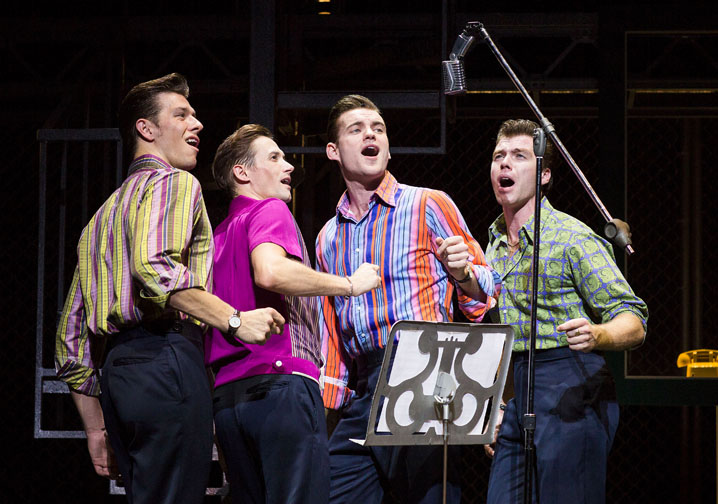 There may be those who say The Jersey Boys was story lying around waiting to be told and there may be those lying around in dark corners hiding from the Feds under their feds who say it should never have been told. The former might say it is a classic story of escape from a downward spiral of crime in an environment where nefarious activity was endemic; a classic story of self-belief and perseverance, of boundless talent and drive. Others might say certain persons should keep their mouths shut in case certain parties should be disrespected. Being in debt to the mob is never going to be a trouble free relationship.
There may be those who say The Jersey Boys was story lying around waiting to be told and there may be those lying around in dark corners hiding from the Feds under their feds who say it should never have been told. The former might say it is a classic story of escape from a downward spiral of crime in an environment where nefarious activity was endemic; a classic story of self-belief and perseverance, of boundless talent and drive. Others might say certain persons should keep their mouths shut in case certain parties should be disrespected. Being in debt to the mob is never going to be a trouble free relationship.
The writers, having squared the latter problem with the parties in question then took the kitchen sink approach and decided to put in as much material as possible. This meant that to get to the juicy bits, where the big numbers get an airing, we had to skim over the early days of struggle and rejection (incidentally delivering the best line of the show, ‘Come back when you’re black’.) Incidentally, it does make you wonder how we have any kind of artistic life at all when it appears that anybody who is anybody gets rejected umpteen times before they get the ‘big break’ in whatever their chosen field of endeavour.
Anyway, finally we get to Bob Gaudio’s, ‘Sherry’ and a wave of recognition sweeps over the audience, the good folk behind me stop eating popcorn and we all hear the song for the first time, even those who have heard it many times before coming out of a small portable radio. The soaring falsetto of Tim Driesen as Frankie Valli, harmonising with the other ‘Seasons’ in Ron Melrose’s arrangement and the full auditorium filling sound prompts an instinctive grin of approval. Without a ‘by your leave’ we are then into, ‘Big Girls Don’t Cry’ (something to do with a line from a John Wayne film) and ‘Walk Like a Man’, the import of which it seems needed explaining to producer, Bob Crewe (given a nice period camp by Matt Gillett).
At this point I wondered where the show would go from here, the boys having made it, other than a canter through the catalogue. In act two however the earlier dalliance with the mob and Tommy deVito’s (Stephen Webb) gambling come back to bite the group and there is a bit of intrigue before Valli asserts himself in an act of selflessness and determines to wipe out the debts of the group’s progenitor. There are group disagreements and family tragedy to come, but standing out from all this are the songs which are all given presentations as slick as the hairdos. The tightly sprung Mr Driesen takes his character from callow youth to maturity, glowing with confidence the while. It is a star performance supported by a very talented cast that had the audience on their feet and clapping along at the end. ★★★★☆ Graham Wyles 28/05/15


